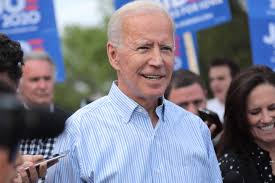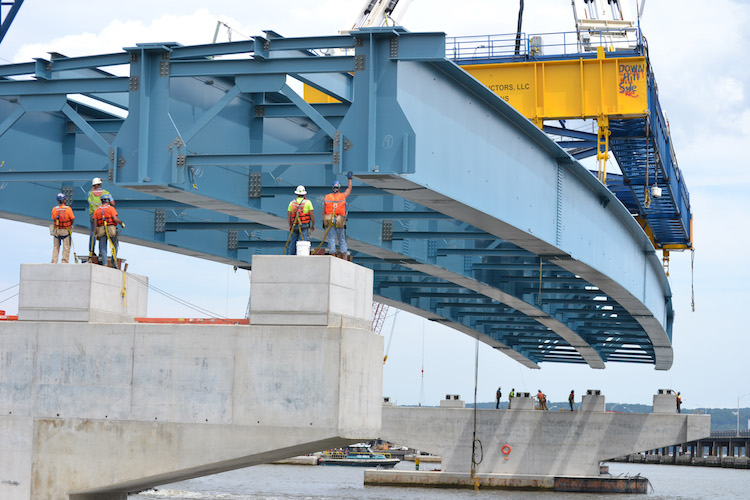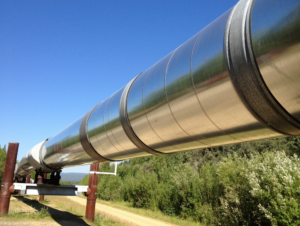Canada has launched a multi-front approach to “Buy America” policies that includes seeking exemptions from both current and future policies. A special committee of the Canadian Parliament has called on the Canadian government to seek “a full
The White House issued initial guidance to implement President Biden’s Made in America order, focusing on increasing opportunities for domestic sourcing and reducing the need for waivers of Made in America laws. It calls for a phased-in

Joe Biden, the presumptive Democratic nominee for president, on July 9 put forward a Buy American plan that includes elements that coincide with President Trump’s aims of tightening domestic content requirements and waivers. The Biden plan also includes
 On February 12, President Trump unveiled an infrastructure plan that calls for $1.5 trillion in infrastructure investments. Surprisingly, it does not incorporate the President's strong Buy America rhetoric of  the past year. That absence has drawn criticism and can be expected to lead to efforts to incorporate local content requirements in any infrastructure bill drafted by the Congress. This post reviews the Presidentâs proposal and recommends that any Buy America requirement inserted into infrastructure legislation follow the approach of the 2009 stimulus package and ensure compliance with U.S. trade obligations.
In presenting his infrastructure framework, the President called on Congress âto draft and pass the most comprehensive infrastructure bill in our Nationâs historyâ. It addresses traditional infrastructure, such as roads, bridges and airports, as well as drinking and wastewater systems, waterways, water resources, energy, rural infrastructure, public lands, veteransâ hospitals, and Brownfield and Superfund sites.
Under the Administrationâs plan, the federal government would contribute $200 billion, with the remainder of the $1.5 trillion picked up by state and local governments and the private sector, including through broader use of public-private partnerships (PPPs). The White House breaks down the $200 billion federal contribution as follows:
On February 12, President Trump unveiled an infrastructure plan that calls for $1.5 trillion in infrastructure investments. Surprisingly, it does not incorporate the President's strong Buy America rhetoric of  the past year. That absence has drawn criticism and can be expected to lead to efforts to incorporate local content requirements in any infrastructure bill drafted by the Congress. This post reviews the Presidentâs proposal and recommends that any Buy America requirement inserted into infrastructure legislation follow the approach of the 2009 stimulus package and ensure compliance with U.S. trade obligations.
In presenting his infrastructure framework, the President called on Congress âto draft and pass the most comprehensive infrastructure bill in our Nationâs historyâ. It addresses traditional infrastructure, such as roads, bridges and airports, as well as drinking and wastewater systems, waterways, water resources, energy, rural infrastructure, public lands, veteransâ hospitals, and Brownfield and Superfund sites.
Under the Administrationâs plan, the federal government would contribute $200 billion, with the remainder of the $1.5 trillion picked up by state and local governments and the private sector, including through broader use of public-private partnerships (PPPs). The White House breaks down the $200 billion federal contribution as follows:
On February 12, President Trump unveiled an infrastructure plan that calls for $1.5 trillion in infrastructure investments. Surprisingly, it does not incorporate the President’s strong Buy America rhetoric of the past year. That absence has drawn
 On January 24, President Donald Trump directed the Secretary of Commerce to develop a plan for the construction of American-made pipelines. This directive is an initial step in implementing the President's promise that his trade policy would be based on two main principles: Buy America and Hire America. Those are the two arms of his newly created National Trade Council. The Buy America directive raises questions regarding the potential expansion of domestic content requirements.
Trumpâs Presidential Memorandum gives the Commerce Secretary six months to develop a plan âunder which all new pipelines, as well as retrofitted, repaired, or expanded pipelines, inside the borders of the United States, including portions of pipelines, use materials and equipment produced in the United Statesâ. In addition to adding the conditions that the Buy America requirement be applied âto the maximum extent possible and to the extent permitted by lawâ, the directive elaborates on what is meant by âproduced in the United Statesâ.
The President specifies that all manufacturing processes for iron and steel products, from the initial melting stage through the application of coatings, must occur in the U.S. The made-in-America requirement will not be satisfied where steel or iron material or products are manufactured abroad from U.S. semi-finished steel or iron or manufactured in the U.S. from foreign semi-finished steel or iron.
The U.S. already mandates the use of U.S.-made iron and steel and manufactured products in a variety of infrastructure projects. Existing Buy America requirements apply to public projects undertaken by governmental entities with federal funds. In particular, such requirements apply to transportation projects. In accordance with legislative requirements, the Department of Transportation imposes domestic content requirements on highway, railway and transit projects and airport expansions.
Because Buy America requirements in public projects discriminate against foreign products, they are inconsistent with U.S. obligations under agreements that apply to government procurement. As a consequence, the U.S. excludes those requirements from its procurement commitments under the WTO Government Procurement Agreement and free trade agreements (FTAs).
The Presidentâs call for a plan for American-made pipelines does not appear to be limited to public projects funded by the federal government. Rather, it would appear to apply to private pipeline projects since most, if not all, pipelines are constructed by private entities. Is the President seeking a means of extending Buy America requirements to the private sector? If so, how would they be enforced? Will Congress be asked to enact legislation to mandate them? Will the Commerce plan provide for compliance with U.S. trade obligations under the WTO and FTAs in carrying out Buy America requirements for pipelines?
On the same day that he issued his pipeline directive, the President issued memoranda that are aimed at advancing two private pipelines that had been stymied by the Obama Administration. The Keystone XL Pipeline memorandum to the Secretaries of State, Army and Interior invites TransCanada, the pipeline developer, to promptly re-submit its application to the Department of State for a Presidential permit for the construction and operation of the pipeline. It also directs the Department of State and other agencies to review such application expeditiously.
The second Presidential memorandum to the Secretary of the Army aims to clear the way for the construction of the Dakota Access Pipeline. On December 4, 2016, the U.S. Army Corps of Engineers announced that it would not grant an easement for the pipeline under Lake Oahe and was undertaking an environmental impact statement to look at possible alternative routes. The Trump memorandum calls for expedited review and approval of federal permits and approvals relating to that pipeline.
Are these pipeline projects the type of pipelines that would be required by the Trump Administration to use only American-made steel and iron products? The pipeline plan that the Commerce Department develops may provide an indication of how far the new Administration intends to extend Buy America requirements.
Jean Heilman Grier
January 31, 2017
Related Posts
Buy American Requirements: A Djaghe White Paper
Trade under Trump: Emerging Plans
On January 24, President Donald Trump directed the Secretary of Commerce to develop a plan for the construction of American-made pipelines. This directive is an initial step in implementing the President's promise that his trade policy would be based on two main principles: Buy America and Hire America. Those are the two arms of his newly created National Trade Council. The Buy America directive raises questions regarding the potential expansion of domestic content requirements.
Trumpâs Presidential Memorandum gives the Commerce Secretary six months to develop a plan âunder which all new pipelines, as well as retrofitted, repaired, or expanded pipelines, inside the borders of the United States, including portions of pipelines, use materials and equipment produced in the United Statesâ. In addition to adding the conditions that the Buy America requirement be applied âto the maximum extent possible and to the extent permitted by lawâ, the directive elaborates on what is meant by âproduced in the United Statesâ.
The President specifies that all manufacturing processes for iron and steel products, from the initial melting stage through the application of coatings, must occur in the U.S. The made-in-America requirement will not be satisfied where steel or iron material or products are manufactured abroad from U.S. semi-finished steel or iron or manufactured in the U.S. from foreign semi-finished steel or iron.
The U.S. already mandates the use of U.S.-made iron and steel and manufactured products in a variety of infrastructure projects. Existing Buy America requirements apply to public projects undertaken by governmental entities with federal funds. In particular, such requirements apply to transportation projects. In accordance with legislative requirements, the Department of Transportation imposes domestic content requirements on highway, railway and transit projects and airport expansions.
Because Buy America requirements in public projects discriminate against foreign products, they are inconsistent with U.S. obligations under agreements that apply to government procurement. As a consequence, the U.S. excludes those requirements from its procurement commitments under the WTO Government Procurement Agreement and free trade agreements (FTAs).
The Presidentâs call for a plan for American-made pipelines does not appear to be limited to public projects funded by the federal government. Rather, it would appear to apply to private pipeline projects since most, if not all, pipelines are constructed by private entities. Is the President seeking a means of extending Buy America requirements to the private sector? If so, how would they be enforced? Will Congress be asked to enact legislation to mandate them? Will the Commerce plan provide for compliance with U.S. trade obligations under the WTO and FTAs in carrying out Buy America requirements for pipelines?
On the same day that he issued his pipeline directive, the President issued memoranda that are aimed at advancing two private pipelines that had been stymied by the Obama Administration. The Keystone XL Pipeline memorandum to the Secretaries of State, Army and Interior invites TransCanada, the pipeline developer, to promptly re-submit its application to the Department of State for a Presidential permit for the construction and operation of the pipeline. It also directs the Department of State and other agencies to review such application expeditiously.
The second Presidential memorandum to the Secretary of the Army aims to clear the way for the construction of the Dakota Access Pipeline. On December 4, 2016, the U.S. Army Corps of Engineers announced that it would not grant an easement for the pipeline under Lake Oahe and was undertaking an environmental impact statement to look at possible alternative routes. The Trump memorandum calls for expedited review and approval of federal permits and approvals relating to that pipeline.
Are these pipeline projects the type of pipelines that would be required by the Trump Administration to use only American-made steel and iron products? The pipeline plan that the Commerce Department develops may provide an indication of how far the new Administration intends to extend Buy America requirements.
Jean Heilman Grier
January 31, 2017
Related Posts
Buy American Requirements: A Djaghe White Paper
Trade under Trump: Emerging Plans
On January 24, President Donald Trump directed the Secretary of Commerce to develop a plan for the construction of American-made pipelines. This directive is an initial step in implementing the President’s promise that his trade policy would
A bill introduced in the waning days of the 114th Congress would impose a new domestic preference on shipping. Unlike U.S. cargo preference laws that have long mandated use of U.S.-flag vessels for ocean-borne cargo purchased or financed by the U.S.
The Senate and the House of Representatives passed different versions of the Water Resources Development Act of 2016 (WRDA). The Senate version included a Buy America provision that applied to water infrastructure projects, but the House bill did not. In
On May 2, Greenpeace published online a number of leaked negotiating documents from the Transatlantic Trade and Investment Partnership (TTIP). The documents are not dated, but most likely do not reflect the results of the 13th round of negotiations, which
A Djaghe white paper on State Procurement under Trade Agreements provides a comprehensive examination of state procurement that is covered under trade agreements and various issues related to that coverage. The white paper compiles 11 posts from
On April 1, the U.S. Trade Representative (USTR) notified Congress of six changes to existing laws that will be required to bring the United States into compliance with its obligations under the Trans-Pacific Partnership (TPP). Four of the changes are